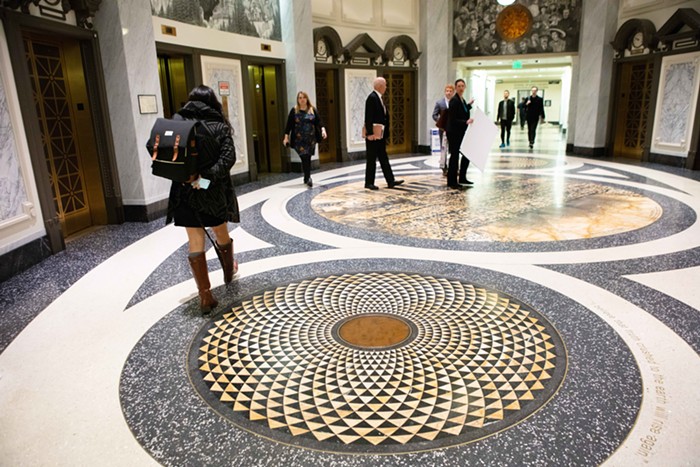
The city of Seattle won a couple of small legal victories Friday morning in their fight to defend the Showbox ordinance, including a dismissal of a $40 million claim against the city.
Forbes sued the city for more than $40 million in damages last month after the City Council passed an ordinance temporarily including his Showbox nightclub in the Pike Place Historical District. Forbes had planned on selling the venue to a developer who wanted to bulldoze the historic nightclub and replace it with a $100 million, 44-story apartment building. The city's ordinance added new protections on the building that made that project far less likely to happen, at least during the 10 months it was included in the historical district.
Forbes argued in his lawsuit that the city's action was illegal and had unconstitutionally taken $40 million from him. The city retorted that the ordinance doesn't actually deny any building permits for Forbes, it only adds more hoops to jump through, so he can't yet argue that anything has been taken from him. Judge Mary E. Roberts agreed with the city Friday morning.
"I am ruling the constitutional taking claim is not ripe for review because there is not a final governmental decision with regards to the application of the regulations. So the unconstitutional taking claim will be dismissed as unripe," Roberts said.
Forbes' attorneys have sued for damages relating to a number of other claims against the city, so Roberts' action does dismiss all damages sought against the city.
Roberts dealt Forbes another blow when she ruled that he cannot sue under the state's Land Use Petition Act (LUPA), substantially narrowing the legal avenue Forbes can pursue against the city. Forbes attorneys were attempting to use the LUPA to invalidate the city's ordinance and pay Forbes' attorney fees. Roberts ruled that because the Showbox ordinance did not actually decide on an application, Forbes could not sue under LUPA's rules.
"There has not been a submitted proposal or application and so there are not yet vested rights in the project... so the LUPA claim will be dismissed," Roberts said.
Forbes attorneys didn't look happy hearing Roberts decision on those matters, but their case against the city is still far from decided. Forbes' attorneys have sued the city on multiple charges and Roberts refused the city's request to dismiss other charges in the lawsuit.
Those other claims include a violation of the state's Appearance of Fairness Statute (AOF) and a claim the city's temporary protections were essentially compelling Forbes to speak in a certain way by maintaining the music venue, which his attorneys argue is a violation of his first amendment rights.
The city asked Roberts to dismiss both of those charges but she refused to do so. The state's AOF statute requires officials to conduct business in a non-partial and open way when deciding on things like building permits, which the law refers to as "quasi-judicial hearings." The City Council clearly wasn't acting in an unbiased way—councilmembers were openly organizing for protecting the venue—but the city argues that doesn't matter because the AOF statute does not apply in this instance.
Roberts wasn't willing to go that far, telling the courtroom that she would not dismiss the AOF statute because the City Council's hearing could be "seen as a quasi-judicial hearing."
Roberts was also not willing to dismiss Forbes' claim that his freedom of speech has been violated, saying the council's action could possibly be seen as "punishing the plaintiff for failing to promise to undergo certain performances."
Forbes' attorneys had attempted to depose Councilmembers Sally Bagshaw and Kshama Sawant under oath, but that request was rescinded at today's hearing. Forbes' attorneys could file another deposition request in the future.
This was the first hearing in this case and the judge did not consider a number of other claims Forbes has filed against the city, including that the city violated his rights to due process and equal protection.



















